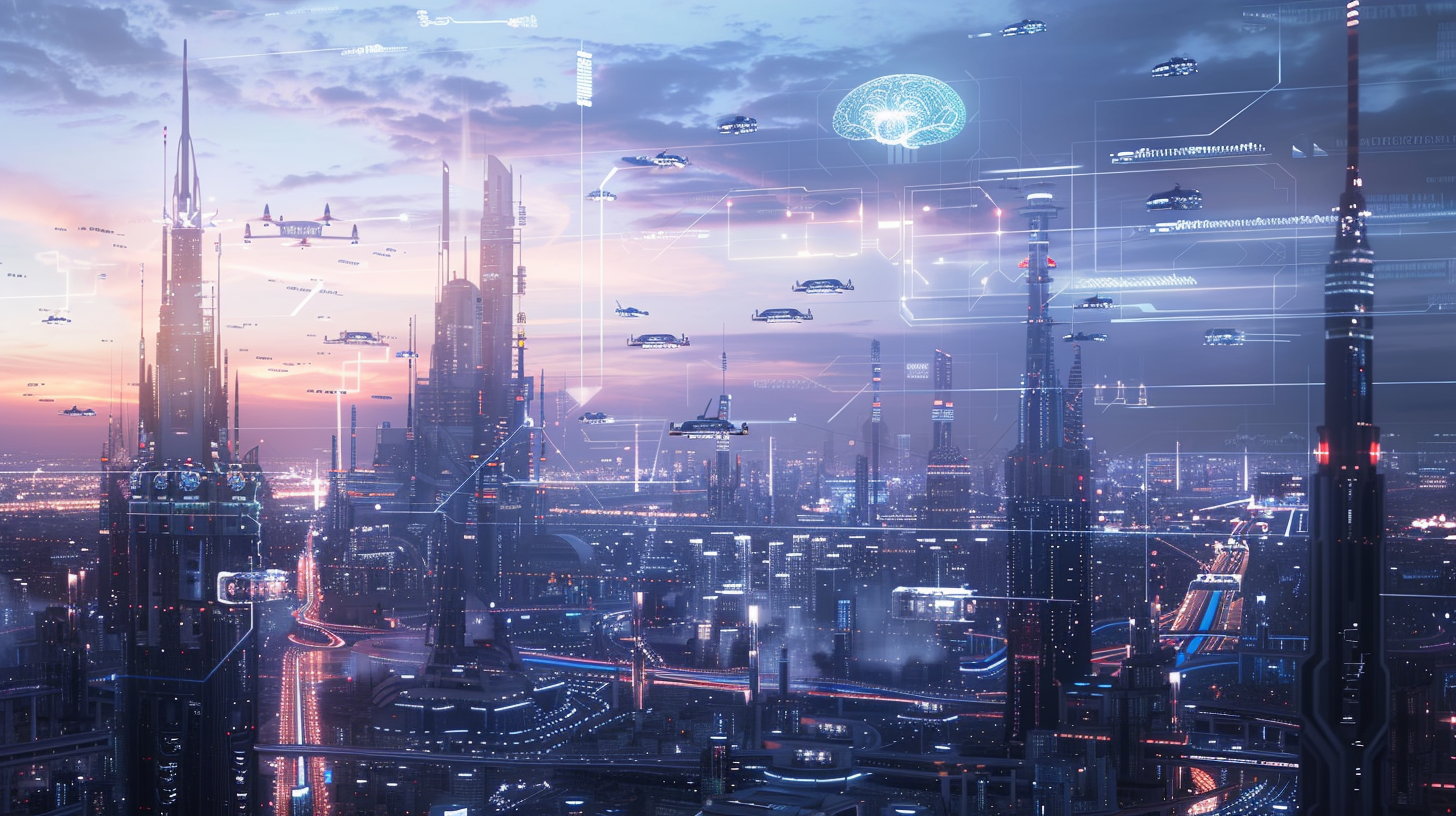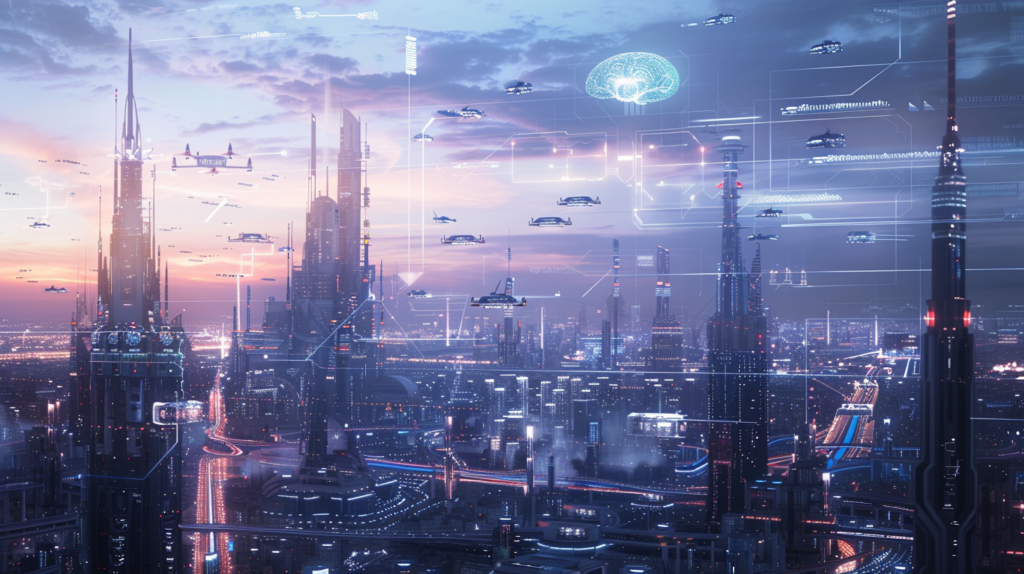Contact


From smart homes to healthcare, AI is transforming everyday life in 2024. Discover how AI is seamlessly integrating into our daily routines, making tasks easier, more efficient, and personalized like never before.
Have you noticed how AI has quietly integrated into almost every aspect of our daily lives? From the moment we wake up to when we go to sleep, artificial intelligence is there, making our lives easier, more efficient, and even more personalized. AI, once confined to tech industries and sci-fi movies, has become an essential part of everyday tasks, and its influence is only growing. In this article, we’ll explore the various ways AI is transforming our daily routines in 2024 and how these advancements are shaping the future.
Smart Homes
AI is at the heart of the smart home revolution, turning our living spaces into highly efficient, responsive environments. Smart thermostats like Nest learn our daily routines and adjust the temperature to save energy without sacrificing comfort. Smart lighting systems, such as those from Philips Hue, can be controlled via voice commands, set to adapt to our moods, or even programmed to simulate our presence when we’re away, enhancing security.
These smart home devices aren’t just about convenience; they are also about sustainability. By optimizing energy usage, AI helps reduce our carbon footprint, making our homes more environmentally friendly without any extra effort on our part. Imagine waking up to a perfectly heated home, lights gently brightening to mimic the sunrise, and your morning coffee ready, all thanks to AI.
The integration of AI in smart homes is just the beginning. Future developments promise even greater automation and efficiency, with AI systems that can anticipate our needs before we even express them.
Virtual Assistants
Virtual assistants like Alexa, Google Assistant, and Siri have become integral to managing our day-to-day tasks. These AI-powered helpers do much more than just answer questions; they control smart home devices, manage schedules, and even offer personalized recommendations based on your habits and preferences. They’re increasingly becoming our go-to for everything from setting reminders to playing music, making daily tasks more convenient.
Imagine walking into your home and saying, “Hey Google, I’m home,” and having your virtual assistant turn on the lights, play your favorite playlist, and remind you of your evening plans. This seamless integration of AI into our daily routines makes life simpler and more enjoyable.
The future of virtual assistants looks even brighter with advancements in natural language processing (NLP). These assistants will become more intuitive and conversational, capable of understanding complex requests and providing even more personalized assistance.
Personalized Recommendations
Ever wondered how online stores always seem to know what you’re looking for? AI algorithms analyze your browsing history, past purchases, and even the time you spend looking at particular items to suggest products you might like. This personalization isn’t just limited to shopping—streaming services like Netflix and Spotify use similar AI-driven algorithms to recommend movies, shows, and music tailored to your tastes.
This level of personalization goes beyond just convenience. It enhances the overall shopping and entertainment experience, making it more enjoyable and tailored to individual preferences. Imagine receiving product recommendations that perfectly match your style and interests, or discovering new music that aligns with your taste, all thanks to AI.
In the future, AI-driven personalization will continue to evolve, offering even more accurate and relevant recommendations. This will make online shopping and content consumption more enjoyable and efficient.
Customer Service
Customer service is another area where AI is making a big impact. AI chatbots are now capable of handling a wide range of inquiries, offering 24/7 support without the need for human intervention. These bots can answer common questions, process orders, and even troubleshoot issues, providing a level of service that’s both efficient and personalized.
Imagine needing help with an online purchase at midnight and getting instant assistance from an AI chatbot. This level of accessibility ensures that customers always have support when they need it, enhancing the overall customer experience.
The future of AI in customer service looks promising, with chatbots becoming even more sophisticated and capable of handling more complex queries. This will lead to faster resolutions and increased customer satisfaction.
Autonomous Vehicles
AI is driving significant advancements in transportation, particularly with autonomous vehicles. Companies like Tesla, Waymo, and others are pioneering self-driving technology that promises to revolutionize the way we travel. These vehicles use AI to process data from sensors and cameras, allowing them to navigate roads, avoid obstacles, and even make real-time decisions in complex traffic situations.
Imagine commuting to work in a self-driving car that safely navigates traffic while you relax or catch up on emails. This not only makes travel more convenient but also has the potential to reduce accidents caused by human error.
The future of autonomous vehicles is bright, with ongoing advancements in AI making these cars safer and more reliable. We can expect to see widespread adoption of self-driving technology in the coming years.
Traffic Management
Beyond self-driving cars, AI is also being used to improve traffic flow in cities. AI systems analyze traffic patterns in real-time, adjusting traffic signals to reduce congestion and improve the efficiency of public transportation. This not only makes commuting faster but also helps reduce emissions and improve air quality.
Imagine a city where traffic lights adjust in real-time to keep traffic moving smoothly, reducing wait times and making public transportation more efficient. This level of optimization benefits everyone, from daily commuters to the environment.
The future of AI in traffic management holds great promise. With ongoing advancements, we can expect even more efficient and environmentally friendly transportation systems.
Diagnostics and Treatment
AI is transforming healthcare by enhancing the accuracy of diagnostics and treatment plans. AI-powered tools can analyze medical images, detect anomalies, and even predict the likelihood of certain diseases, often with greater accuracy than human doctors. These tools are being used to assist in surgeries, where AI can help guide surgeons or even perform minimally invasive procedures autonomously.
Imagine a world where AI can diagnose diseases early, leading to more effective treatments and better patient outcomes. This level of precision and efficiency is revolutionizing healthcare, making it more accessible and effective.
The future of AI in healthcare looks promising, with ongoing advancements in AI-driven diagnostics and treatments. We can expect even more accurate and personalized healthcare solutions in the coming years.
Health Monitoring
Wearable devices like the Apple Watch or Fitbit have taken health monitoring to the next level, thanks to AI. These devices can track vital signs in real-time, alerting users to potential health issues before they become serious. AI algorithms analyze the data collected, providing insights into sleep patterns, activity levels, and overall health, empowering users to make informed decisions about their well-being.
Imagine wearing a device that continuously monitors your health, providing real-time feedback and alerts to help you stay healthy. This level of proactive health management is transforming how we approach wellness.
The future of AI in health monitoring holds great promise. With ongoing advancements, we can expect even more accurate and personalized health insights, helping us lead healthier lives.
Personalized Learning
Education is another field where AI is making significant strides. AI-driven platforms are creating personalized learning experiences that adapt to each student’s needs and pace. These systems can identify areas where a student is struggling and offer additional resources or adjust the difficulty level of tasks to ensure that learning is both effective and engaging.
Imagine a classroom where each student receives personalized instruction tailored to their learning style and needs. This level of customization enhances the learning experience, making it more effective and enjoyable.
The future of AI in education looks promising, with ongoing advancements in personalized learning platforms. We can expect even more effective and engaging educational experiences in the coming years.
Virtual Tutors
AI-powered virtual tutors are becoming more common, offering students one-on-one assistance outside the classroom. These tutors can provide explanations, answer questions, and even grade assignments, freeing up teachers to focus on more complex instructional tasks and giving students additional support when they need it most.
Imagine having a virtual tutor available 24/7 to help with homework, answer questions, and provide feedback. This level of support enhances the learning experience, making it more effective and accessible.
The future of AI in education looks bright, with virtual tutors becoming even more sophisticated and capable of providing personalized assistance. This will lead to better learning outcomes and increased student engagement.
Ongoing Developments
AI continues to evolve, and its future applications promise to be even more integrated into our lives. Augmented reality (AR) and AI are starting to merge, creating interactive experiences that blend the digital and physical worlds. In homes, AI-driven automation systems are becoming more sophisticated, offering an even greater level of convenience and efficiency.
Imagine a world where AI and AR combine to create immersive experiences that enhance our daily lives. This level of integration promises to revolutionize how we interact with technology.
The future of AI holds great promise, with ongoing advancements in AI-driven technologies. We can expect even more innovative and integrated solutions that enhance our daily lives.
Ethical Considerations
While AI offers many benefits, it also raises important ethical questions. Issues like data privacy, algorithmic bias, and the impact of AI on employment need to be carefully considered as we continue to integrate AI into our lives. It’s crucial that we address these challenges to ensure that AI develops in a way that benefits everyone.
Imagine a world where AI is used ethically and responsibly, ensuring that its benefits are shared by all. This level of commitment to ethical considerations is essential for the successful integration of AI into our lives.
The future of AI depends on how we address these ethical challenges. By prioritizing ethical considerations, we can ensure that AI develops in a way that benefits everyone.
AI is no longer just a futuristic concept—it’s a part of our daily lives, quietly making tasks easier, more efficient, and more personalized. From smart homes and autonomous vehicles to personalized shopping experiences and advanced healthcare, AI is transforming how we live in 2024 and beyond. As AI continues to evolve, staying informed about these developments will help us make the most of this powerful technology.